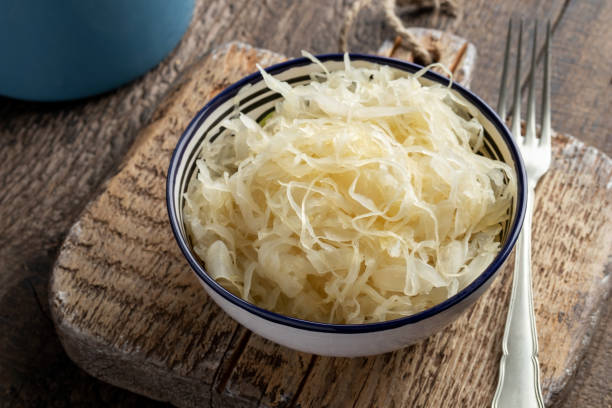5 Remarkable Health Benefits of Sauerkraut
5 Remarkable Health Benefits of Sauerkraut

5 Remarkable Health Benefits of Sauerkraut
In a pool of fermented foods, sauerkraut offers a tangy and delightful powerhouse of health benefits. Derived from the German words "sauer" meaning sour and "kraut" meaning cabbage, sauerkraut has a rich history dating back centuries. Beyond its distinct flavor and crispy texture, sauerkraut offers numerous health benefits making it more than just a topping for hot dogs. In this article, we'll uncover 5 remarkable health benefits of sauerkraut that might encourage you to include this fermented gem in your diet. But before that, let’s check the nutritional composition of this tangy treasure.
Nutrition
Nutritional composition for 1 cup (142g) serving of sauerkraut:
- Calories: Approximately 27 kcal
- Carbohydrates: About 6 grams
- Dietary Fiber: Roughly 4 grams
- Sugars: Around 2 grams
- Protein: About 1 gram
- Fat: Virtually 0 grams
- Sodium: Around 938 milligrams (Note: Sodium content can vary widely depending on the preparation and brand)
- Vitamin C: Approximately 35% of the Recommended Daily Intake (RDI)
- Vitamin K: Roughly 23% of the RDI
Sauerkraut is also a source of various vitamins and minerals in smaller amounts, including B vitamins, iron, potassium, and calcium. Additionally, sauerkraut's fermentation process enhances its nutritional value by increasing the availability of certain nutrients and promoting the growth of beneficial bacteria that can contribute to gut health.
5 Health Benefits of SauerKraut
Gut Health's Best Friend
Sauerkraut is a natural probiotic loaded with live bacteria that support a healthy gut microbiome. The fermentation process encourages the growth of beneficial bacteria, such as Lactobacillus, that aid digestion and improve gut health. A balanced gut microbiome contributes to better nutrient absorption, enhanced immune response, and mood regulation.
Immune System Boost
Fermented foods like sauerkraut contain ample amounts of vitamins C and K crucial for boosting the immune system. Vitamin C is known for its antioxidant properties that help fend off harmful free radicals, while vitamin K contributes to proper blood clotting and bone health. Incorporating sauerkraut into your diet can give your immune system an extra layer of defense.
Digestive Harmony
Thanks to its probiotic content, sauerkraut supports a healthy digestive system. The live bacteria aid in breaking down complex foods, making nutrients more accessible for absorption. This can alleviate digestive discomfort, bloating, and irregular bowel movements. Incorporating sauerkraut into your meals can contribute to smoother digestion.
Heart Health Guardian
Sauerkraut's potential to promote heart health lies in its ability to lower cholesterol levels. The fermentation process produces bioactive compounds known as isothiocyanates, which have been linked to reducing cholesterol absorption. By enjoying sauerkraut regularly, you're making a heart-smart choice that may contribute to a healthier cardiovascular system.
Anti-Inflammatory Ally
Inflammation is at the root of many chronic diseases. Sauerkraut contains antioxidants and anti-inflammatory compounds that can combat inflammation and oxidative stress. Cabbage is rich in phytonutrients, loaded with anti-inflammatory properties, further adding to sauerkraut's potential to promote overall health.
Final Thoughts
Sauerkraut's journey from cabbage to culinary marvel has left us with a versatile and healthful delight. From supporting gut health to bolstering the immune system, sauerkraut's benefits are as diverse as its cultural heritage. When next you want to enjoy fermented food, consider adding sauerkraut to your diet for its tangy taste and potential to elevate your well-being. Remember, a spoonful of sauerkraut each day could keep more than just the doctor away – it could be the key to unlocking a healthier you.
